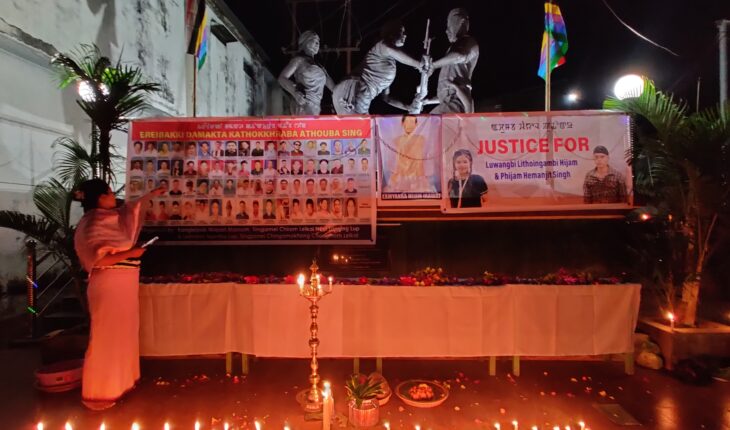Every September, the state of Manipur is cloaked in remembrance for a leader who relentlessly championed the cause of the downtrodden, the impoverished, and the students. His indomitable spirit and commitment to social reformation in Manipur have etched an enduring legacy that continues to be celebrated and revered by many. Yet, this year’s commemorations took a distinct turn. Instead of the typical memorial events, the tribute paid to this great leader was more profound and resonant than in previous years. However, this heightened attention, while a testament to his significance, also raises concerns about the underlying reasons for this shift in sentiment, suggesting that not all changes signal positive developments.
Among the sea of faces, portraits of Hijam Irabot prominently held their place, a testament to his undying legacy. Yet, this year, alongside his venerable image, two new faces emerged – those of 17-year-old Hijam Linthoingambi and 20-year-old Phijam Hemanjit. These two young Meitei students were tragically killed, allegedly by Kuki militants, an incident that sent shockwaves through the community. As the people of Manipur paid their tributes, it was evident that their grief was twofold: mourning the loss of these innocent lives and yearning for a stalwart leader like Hijam Irabot, whose presence they believe could have deterred such atrocities. The juxtaposition of these images was a poignant reminder of the continued struggle for peace and the desperate need for visionary leaders to pave the way for a harmonious future.
The turmoil that now engulfs Manipur has stretched on, unrelentingly, for nearly five months. The very fabric of the state’s law and order seems to have unravelled, with an intensity of discord not witnessed in recent history. The Meitei and Kuki communities, historically co-inhabitants of this beautiful state, have been locked in a brutal conflict. Encounters have escalated to the point where any opportunity is seized upon to inflict harm, be it through bloodshed or the destruction of property. The aftermath of these confrontations is grim, with over 50,000 individuals forced from their homes, now living as internally displaced persons. The conditions of these makeshift relief camps are heart-wrenching, with stories of suffering and despair echoing from within their confines.
Many view the spiralling situation as an indictment of the state’s leadership.
The poignant reflection on past leaders like Hijam Irabot becomes more than just an exercise in nostalgia; it underlines the yearning of the Manipuri people for a guiding force, someone capable of restoring peace and fostering understanding between warring communities. The anguish is not just over lost lives and burned homes but also the lost sense of unity and shared purpose. The question on everyone’s mind is: who will step forward to bridge this chasm and lead Manipur towards a brighter, more harmonious future?
The stark contrast between the leadership of yesteryears and today’s political scenario is palpable. Hijam Irabot’s legacy towers over contemporary leaders, and the current administration, led by Chief Minister N Biren Singh, seems to pale in comparison. The public demands a new leader – a leader who is capable, not a leader who fooled its people. While repeated assurances have been given by the government regarding the restoration of normalcy, the situation remains tense and volatile even after nearly five months.
True leadership is tested in times of crisis. The protracted unrest in Manipur, lasting for months on end, has been a litmus test for the state’s leadership—a test that, in the eyes of many, it appears to be failing. The fading optimism among the public is evident, and many yearn for the integrity, commitment, and vision that leaders like Irabot once brought to the table.
Irabot was not just a political figure; he was a multifaceted personality, revered as a poet, dramatist, journalist, and above all, a dedicated revolutionary. His journey is emblematic of the sacrifices one makes for the greater good. Irabot renounced personal comforts, titles, and privileges, transitioning from ‘Mamak Ibungo’ (Royal son-in-law) to Member of the Sadar Panchayat Court. His primary goal was to uplift the downtrodden and challenge the status quo. Irabot’s struggle against the systemic corruption, nepotism, and favouritism ingrained in the colonial and monarchical structures is legendary. He envisioned a society free from the shackles of exploitation, where equality and justice reigned supreme.
Yet, in stark juxtaposition to his enduring legacy, today’s representatives, the 60 MLAs of Manipur, frequently commute between Imphal and Delhi, funded by the taxpayer’s money. Their numerous trips, which should ideally culminate in decisive action, have yielded no tangible results. The recurring travels to the national capital underscore a disturbing implication—that the resolution to Manipur’s pressing issues lies not within the state but in Delhi. This not only undermines the autonomy and capabilities of the state’s leadership but also raises serious questions about their competence and intent in addressing internal challenges. The ongoing crisis serves as a glaring reminder of the need for visionary, compassionate, and decisive leaders who can navigate the complexities of such conflicts and guide the state towards a peaceful and prosperous future.
The reverence and longing for leaders like Hijam Irabot were palpably evident in yesterday’s observances of his birthday across the state. Amidst the customary tributes and respect for Irabot, the voices of the people raised demands for justice, particularly for the young Linthoingambi and Hemanjit. These observances have evolved beyond mere formalities; they have become a rallying cry for competent leadership, reflecting the deep-seated dissatisfaction and frustration with the current administration.
In Kakwa, a Meira Paibi woman, while immersed in the solemnity of the event, passionately shared her sentiments. She gestured towards the portrait of young Hijam Linthoingambi, noting the haunting gaze in her eyes—a gaze that seemed to challenge and question the very soul of the Meitei community. “Manipur now needs a great leader like Hijam Irabot,” she proclaimed, emphasizing the state’s dire need for guidance and visionary leadership.
The observance in Singjamei painted a somber picture. Beyond the portraits of the slain students, a banner displayed the faces of all those whose lives had been snuffed out in the current conflict by suspected Kuki militants. This poignant tribute echoed in places like Wangkhei, Keishamthong, Uripok, and many others, serving as a painful reminder of the price the state has paid.
As dusk settled over Singjamei, a somber procession formed. Hundreds of individuals took to the streets, holding aloft candles that pierced the night with their flickering glow. They were placed delicately before a banner bearing the faces of the conflict’s victims, interspersed with portraits of Linthoingambi, Hemanjit, and the revered Hijam Irabot. Amid this sea of mourning and remembrance, voices of discontent rose. A grieving woman expressed her anguish at the untimely deaths of the two students, firmly laying the blame on the government’s doorstep. Her sentiments echoed the general consensus:”Our history has never witnessed such an inept government and Chief Minister. If we let this leadership persist, the tears of countless mothers will continue to stain our land. The hour demands a change, a transition to a leader who embodies the spirit and resolve of Irabot.”
This outpouring of emotions underscores the critical juncture at which Manipur finds itself—a state craving decisive, compassionate leadership in these tumultuous times. This year’s observance sharply diverged from those of previous years. The commemorations served not only as a remembrance of Hijam Irabot’s legacy but also as a glaring spotlight on the perceived inadequacies of the current government. The collective longing for a leader of Irabot’s stature is palpable. Considering the prolonged five months of violence and upheaval, the people’s demands for competent leadership resonate deeply and appear entirely justified.




